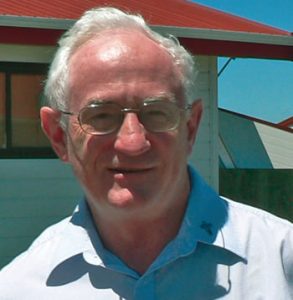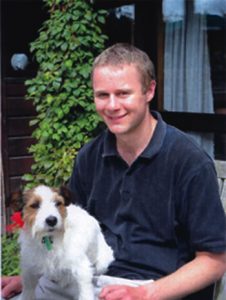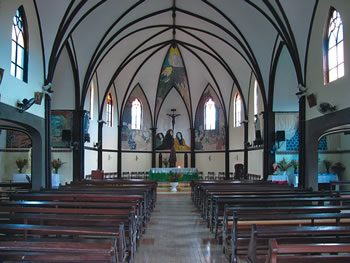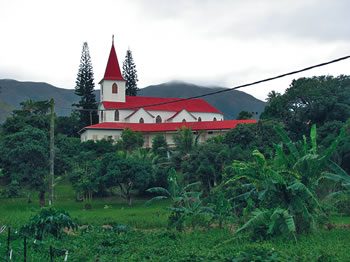Stories of Mercy
Jeremy Gray sm
To mark the Year of Mercy the Marist Messenger will present a series of reflections on the lives of Marists who have worked in New Zealand since 1838 and in whose lives mercy has shone. This article on Jeremy Gray sm was first published in the SMNZ newsletter.
The details of Jeremy Gray’s death are sparse and unforgiving. As part of preparation for final vows he had been on pastoral placement in the parish of St Louis in southern New Caledonia. Before a move inland to a centre for the training of catechists, he decided to join a parish picnic for the people of the neighbouring Mount Doré. Walking a little six year old to the shore, the child ended up in a deep rock-bound pool, sucked under and trapped by the rush of the incoming tide. Jeremy succeeded in pushing the child up the side but could not battle out himself; despite attempts by a local man to pull him out he was dragged out to sea and drowned.
The child’s name was Ishmael. This was the name of Abraham’s first-born, exiled with his mother to the desert, presumably to die. He survived and in legend was depicted as the father of many Arab nations. He was an outcast, an outlier. In a strange way Jeremy was also an outlier, and out of his struggles emerged the compassion that would mark his life and death.
Born in Invercargill, his early education came in Fox Glacier primary, then in an Anglican preparatory school in Winchester, South Canterbury. There his deep devotedness showed itself early, playing dress-up priest and presiding over his class mates in the school chapel. This was the prelude to a deeper search ending in a request at age 17, to his uncle, Fr Geoff Gray, then parish priest of Waimate, to be received into the Catholic Church. Rapid step after rapid step led him from Canterbury university to Good Shepherd House in Christchurch, to Holy Cross College in Auckland and finally to Marist Seminary from where he set forth for New Caledonia.
This was no easy journey. An only son, much beloved, he knew the pain he brought his parents, especially his mother, a devout Anglican, on telling them of his decision to become a Catholic, then to study for the priesthood far away in the North. Marked as a rising star at Holy Cross College for his linguistic brilliance, musical ability and top grades at Good Shepherd College, it cut deep into his fellow students to tell them that he was convinced he had a call to religious life so would be going over to the opposition at the Marist Seminary. Nor was that any cakewalk. Most of the students in Jeremy’s day were from the Pacific – utterly different cultures, life-style, physicality and academic ability. He learned from them how to fish, how to hack out a bush-track, and in turn showed them how to ski. He laboured as a tutor helping them to construct theological essays. It is a mark of his effort that shortly after his death he was due to share a holiday with Denis Revi from Vanuata with whom he had built a strong friendship in Auckland.
On his departure from Marist Seminary Jeremy wrote a short note to his fellow students. In it he spoke of his sadness at leaving a place where he felt happy; “…it has been a ‘school of love’ for me,” but also of a certain unease. It was as if he were living in a corridor between two doors, one closed behind him, the other yet to open. He then added these prophetic words, “When I was at novitiate I was lucky enough to be with elderly people who were dying or who suffered from Alzheimers. And I came to the conclusion that the elderly feel things very deeply, but many also, at the same time, are deeply rooted in God, deeply aware of their desire for him. I am not old. I am only 28. But I can say that now I do feel things more deeply, yet I am also a bit surer of the fact that God is with me, that He is always waiting for me, and that He is always loving me.”
As part of his pastoral training at the seminary Jeremy worked as a mentor at the Maori boarding school, Hato Petera, in Northcote. A gifted linguist, he quickly picked up conversational Maori. He used this in becoming part of a group of adult Maori, sharing their stories of abuse and suffering, a loving and accepting ear. In New Caledonia, this cross-cultural awareness blossomed even further. He turned down the use of a car so he could get around by bus and cycle like many of the locals. He started to pick up elements of Tayo and Wallesian, the local and immigrant languages, so as to speak in their own tongues. His hope was to bring all these painfully acquired skills back to his life in New Zealand.
The regional superior of the New Caledonia region, François Grossin sm, related that after Jeremy’s death he was stopped in the street by people who spoke of their pain at his drowning. He wrote, “All speak of his gentleness, his smile, his humility, his simplicity, his intelligence, his discretion… His death was a reflection of his life: a gift of himself to God and neighbour and a following of Mary who had called him to serve her Son in the Society that bears her name. He died in giving his life to save that of the child, Ishmael.”
From being an outlier, one on the fringe, the gift of mercy brought Jeremy Gray to the centre, to the beating heart of God.
Tagged as: Jeremy Gray, mercy
Comments are closed.




 Entries(RSS)
Entries(RSS)